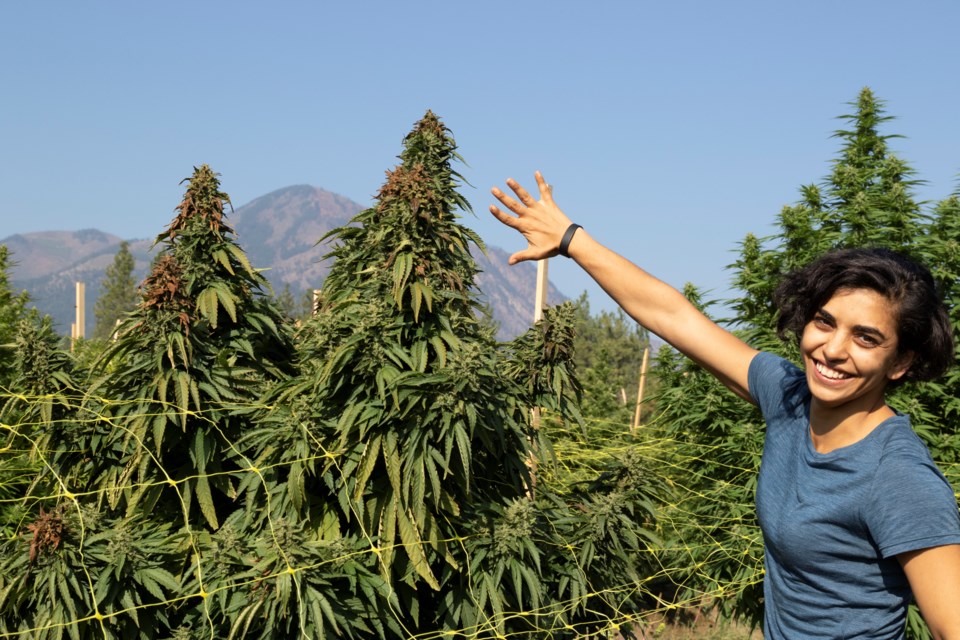Two Pemberton residents are spearheading a venture seeking to tap cannabis for medical use.
Brishna Kamal and Daniel Lantela are co-CEOs of Whistler Therapeutics, which started two-and-a-half years ago, and this summer started to see a significant uptick.
The company is looking to produce, process and research cannabis grown in Lillooet at its 4.9-hectare Earthwolf Farms with significant focus on doing so responsibly, explained Lantela.
“What we really want to do is produce a certified organic or even regenerative medicine where we’re growing organically and regeneratively, improving the soil, sequestering carbon, doing things that are helpful to the health of the planet,” he said.
Whistler Therapeutics started growing its first crops this summer, utilizing 1.2 hectares at Earthwolf and another 3.2 hectares at its joint venture Backcountry Harvest farm.
“We bought the property and we licensed the property for growing cannabis this year. We got licensed pretty late this year, so our farm’s not at capacity,” Kamal said, adding that the company is growing a wide variety of cannabis and testing several variables to create the best possible product.
“There’s a lot of diversity because it’s our first year of operations. What we’ve done is we’ve collected a lot of genetics,” she said. “We’re testing in different growing conditions, using different agricultural practices.
“We’re looking for those strains or cultivars that grow best in Lillooet in the sunshine, outdoors, organically.”
Next up is bringing a 10,600-square-foot research facility, formerly a biochemistry research institute, also in Lillooet, online.
All told, the venture currently has 12 employees in Lillooet, 11 in Whistler, four in Port Coquitlam and there are hopes of adding another 30 in the next 18 months, according to Kamal.
Both scientists by training, Kamal and Lantela met in Montreal, and both worked for Whistler Medical Marijuana (WMM) for several years before venturing out on their own after Aurora Cannabis bought WMM. While at Whistler Medical Marijuana, the duo utilized an ice-water, oil-extraction technique, and later developed proprietary equipment to scale up the process. They spun that off into Whistler Technologies, using those sales to fund Whistler Therapeutics.
Kamal explained that the company is looking to harness cannabis to treat conditions ranging from osteoarthritis to anxiety, with an eye toward creating consistency in the product.
Lantela, meanwhile, stressed that the ultimate goal is to receive a stamp of approval from the medical and scientific sectors.
“Our long-term focus is pharmaceutical development,” he said. “An interesting point to look at is the difference between the terms ‘medicinal’ and ‘medical.’ Medicinal means ‘having healing properties’ and there are tons of medicinal herbs. Medical means something that has been approved by our medical and scientific system.
“Cannabis right now is medicinal. We know it has healing properties and things that can help people’s conditions, but it hasn’t been approved by the medical community to be used for specific conditions.”
Lantela added that while some doctors are aware of some of cannabis’ positive properties, there’s not enough information available to properly prescribe it.
“They don’t know what type, what dose, how many times a day you’re supposed to take it,” he said. “What we want to do is take that scientific testing side where we produce a product that’s standardized and direct it toward certain conditions.
“We saw that patients, if they were using cannabis for pain or anxiety, there were certain types of cannabis that they were choosing over and over that seemed to be the most effective, and there were others where they told us, ‘These don’t work at all.’”
With research into cannabis just starting, Kamal said uses could expand well beyond medical use, with products such as motor oil potentially having a cannabis element in the future.
“There are different ways of working with the plant and a lot of opportunity and I feel like having a research centre along the corridor is going to be helpful in attracting talent from all over the world,” she said.
Although legalization for recreational use came down more than two years ago, attitudes still exist that make it challenging to operate in the field.
“If we have that stigma, then I can’t really do my job,” said Kamal. “If I can’t study the plants, we can’t release products that are consistent that a patient can rely on, [so] what are we doing as a country?” she said. “Legalization hasn’t come. Even though there was a date associated with it, there’s a lot of work to be done transitioning.”
For more, visit whistlertherapeutics.com.




